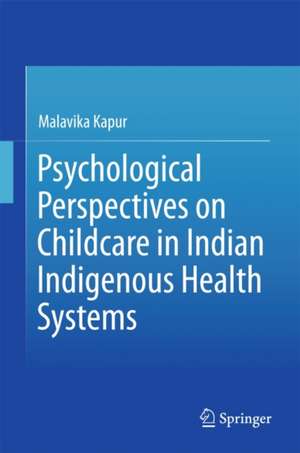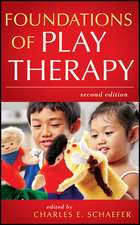Psychological Perspectives on Childcare in Indian Indigenous Health Systems
Autor Malavika Kapuren Limba Engleză Hardback – iul 2015
Though the four systems originated in different geographical regions, they share many common core constructs of a holistic approach consisting of mind-body unity. The core of psychological healing in these systems rests on bringing about harmony and balance of disturbed functions through diet, daily regimen and drugs. However, despite commonalities, understanding of childcare in the four systems varies a great deal. The differences seem to be rooted in local sociocultural, religious and folk healing practices. Remarkably, in all of them, prescriptions of drugs and behaviour are psychologically grounded and uncannily modern from the perspective of developmental psychology. The book raises the following questions as important for further research: whether holistic approaches be adopted for the empirical study of indigenous health systems, where their strength lies; whether personality frameworks identified in the four systems can be incorporated into contemporary medical practice to its advantage; whether preferred childcare practices among the four systems can be studied empirically in current paediatric, psychological and parenting research; and whether faith, if it is of importance to the patient, can be incorporated as an element into contemporary medical practice.
| Toate formatele și edițiile | Preț | Express |
|---|---|---|
| Paperback (1) | 366.22 lei 38-44 zile | |
| Springer India – 23 oct 2016 | 366.22 lei 38-44 zile | |
| Hardback (1) | 395.09 lei 22-36 zile | |
| Springer India – iul 2015 | 395.09 lei 22-36 zile |
Preț: 395.09 lei
Nou
Puncte Express: 593
Preț estimativ în valută:
75.62€ • 82.17$ • 63.57£
75.62€ • 82.17$ • 63.57£
Carte disponibilă
Livrare economică 31 martie-14 aprilie
Preluare comenzi: 021 569.72.76
Specificații
ISBN-13: 9788132224273
ISBN-10: 8132224272
Pagini: 226
Ilustrații: XXI, 265 p. 17 illus., 8 illus. in color.
Dimensiuni: 155 x 235 x 20 mm
Greutate: 0.58 kg
Ediția:2016
Editura: Springer India
Colecția Springer
Locul publicării:New Delhi, India
ISBN-10: 8132224272
Pagini: 226
Ilustrații: XXI, 265 p. 17 illus., 8 illus. in color.
Dimensiuni: 155 x 235 x 20 mm
Greutate: 0.58 kg
Ediția:2016
Editura: Springer India
Colecția Springer
Locul publicării:New Delhi, India
Public țintă
ResearchCuprins
PART- I. Indigenous Systems of Medicine.- Part I.I: Ayurveda.- Chapter 1. Introduction.- Chapter 2. Basic Principles of Ayurveda.- Chapter 3. Developmental Approach to Child Care.- Chapter 4. Disorders of the Newborn.- Chapter 5. Common Childhood Disorders and Treatments.- Chapter 6. Serious Disorders of Childhood and Treatments.- Part-I.II: Unani Medicine (Altib).- Chapter 7. Basic Principles of Unani System.- Chapter 8. Developmental Approach to Child Care.- Chapter 9. Diseases of Children and Some Common Treatments.- Part-I.III: Siddha Medicine.- Chapter 10. Basic Principles of Siddha System.- Chapter 11. Developmental Approaches to Child Care (Balavagadam).- Chapter 12. Disorders of Childhood and Treatments.- Part I.IV: Tibetan Medicine.- Chapter 13. Basic Principles of Tibetan Medicine.- Chapter 14. Developmental Approach to Child Care.- Chapter 15. Common Childhood Disorders and Treatments.- Chapter 16. Serious Disorders of Childhood and Treatments.- PART- II. Gleanings from a Developmental Perspective.- Chapter 17. Gleanings from Ayurveda.- Chapter 18. Gleanings from Unani Medicine.- Chapter 19. Gleanings from Siddha Medicine.- Chapter 20. Gleanings from Tibetan Medicine.- Chapter 21. Reflections on Child Care Across Systems.- Chapter 22. Implications for Theory, Practice and Research.
Notă biografică
Malavika Kapur is Visiting Professor at the National Institute of Advanced Studies, Bangalore. Earlier, she was the Professor and Head of the Department of Clinical Psychology at the National Institute of Mental Health and Neurosciences, Bangalore. She has a Ph.D. in clinical psychology and has 12 books and over 120 publications in peer-reviewed journals to her credit. She is a Fellow of the Indian Association of Clinical Psychologists and the Indian Association of Child and Adolescent Mental Health and the British Psychological Society. Recently, she has been honoured by the National Academy of Psychology with an honorary fellowship and a lifetime achievement award. She has been a consultant for organizations such as the World Health Organization, University Grants Commission, Government of India; the National Council for Educational Research and Training; National Institute of Public Cooperation and Child Development; the Indian Council of Medical Research; and the Indian Council of Social Science Research. She has been twice awarded a scholar in residency at the Study and Conference Centre in Bellagio, Italy, by the Rockefeller Foundation. She has been on the advisory group of the ICD revision of child psychiatric disorders at the WHO Mental Health and Substance Abuse Division, Geneva, from March 2010.
Professor Kapur has a deep interest in culturally embedded psychological assessments and interventions for children with mental health problems. She also works with disadvantageous school children in urban, rural and tribal areas to promote their psychosocial development, using child-centred play way methods. She writes fiction for adults and children and has recently published a fictionalised version of the Kashyapa Samhita as a novel.
Professor Kapur has a deep interest in culturally embedded psychological assessments and interventions for children with mental health problems. She also works with disadvantageous school children in urban, rural and tribal areas to promote their psychosocial development, using child-centred play way methods. She writes fiction for adults and children and has recently published a fictionalised version of the Kashyapa Samhita as a novel.
Textul de pe ultima copertă
This book examines childcare in ancient Indian health systems from the perspective of developmental psychology. The author extensively studies ancient texts and charts from Ayurveda, Unani, Siddha and Tibetan medicines and analyses how gleanings from these systems can be useful in creating preferred practices for modern childcare systems.
Though the four systems originated in different geographical regions, they share many common core constructs of a holistic approach consisting of mind-body unity. The core of psychological healing in these systems rests on bringing about harmony and balance of disturbed functions through diet, daily regimen and drugs. However, despite commonalities, understanding of childcare in the four systems varies a great deal. The differences seem to be rooted in local sociocultural, religious and folk healing practices. Remarkably, in all of them, prescriptions of drugs and behaviour are psychologically grounded and uncannily modern from the perspective of developmental psychology. The book raises the following questions as important for further research: whether holistic approaches be adopted for the empirical study of indigenous health systems, where their strength lies; whether personality frameworks identified in the four systems can be incorporated into contemporary medical practice to its advantage; whether preferred childcare practices among the four systems can be studied empirically in current paediatric, psychological and parenting research; and whether faith, if it is of importance to the patient, can be incorporated as an element into contemporary medical practice.
Though the four systems originated in different geographical regions, they share many common core constructs of a holistic approach consisting of mind-body unity. The core of psychological healing in these systems rests on bringing about harmony and balance of disturbed functions through diet, daily regimen and drugs. However, despite commonalities, understanding of childcare in the four systems varies a great deal. The differences seem to be rooted in local sociocultural, religious and folk healing practices. Remarkably, in all of them, prescriptions of drugs and behaviour are psychologically grounded and uncannily modern from the perspective of developmental psychology. The book raises the following questions as important for further research: whether holistic approaches be adopted for the empirical study of indigenous health systems, where their strength lies; whether personality frameworks identified in the four systems can be incorporated into contemporary medical practice to its advantage; whether preferred childcare practices among the four systems can be studied empirically in current paediatric, psychological and parenting research; and whether faith, if it is of importance to the patient, can be incorporated as an element into contemporary medical practice.
Caracteristici
Includes distinct narrative styles of the four indigenous health systems and extraordinary medical illustrations Provides a comparative perspective of childcare from four ancient healthcare systems for the first time Examines path breaking insights among the four systems to understand relevance to contemporary childcare practices Includes supplementary material: sn.pub/extras







